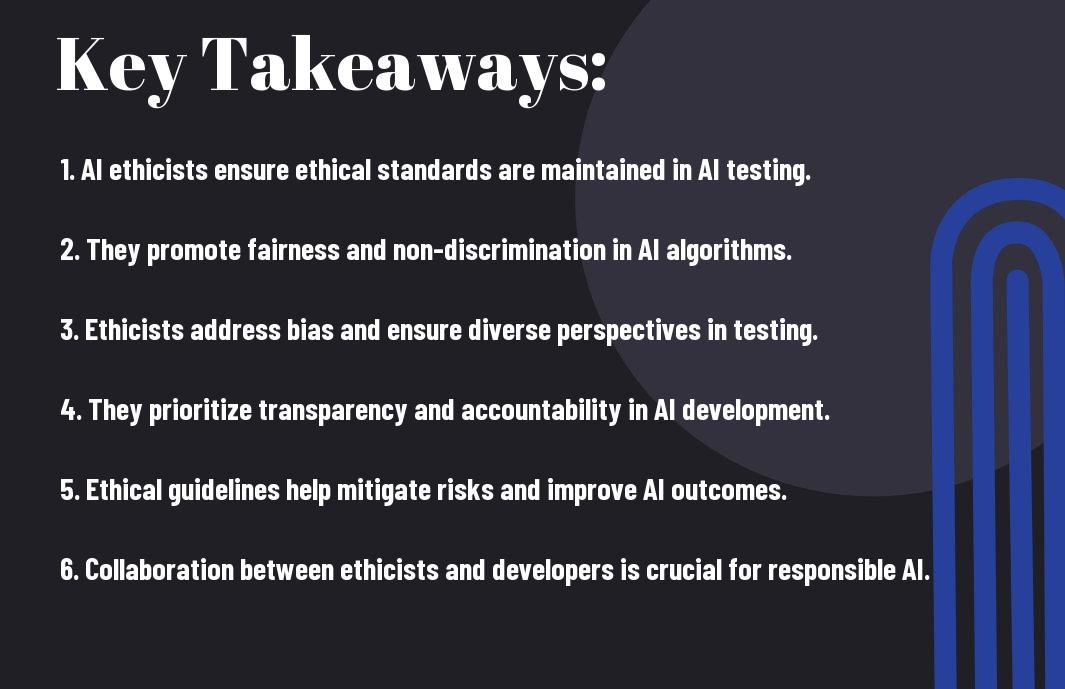There’s a critical aspect of AI development that often goes unnoticed but plays a crucial role in shaping the future of technology – the role of AI ethicists. In this informative piece, we examine into the pivotal responsibilities of AI ethicists in upholding fairness and responsibility in the testing of artificial intelligence systems. Join us as we uncover the ethical considerations and challenges that come with the rapidly advancing world of AI testing.
Key Takeaways:
- Importance of Oversight: AI ethicists play a crucial role in providing oversight and ensuring that AI testing is conducted ethically and responsibly.
- Advocating for Fairness: Ethicists advocate for fairness in AI testing, highlighting the importance of transparency and accountability in the development and deployment of AI technologies.
- Ethical Considerations: AI ethicists analyze and address ethical considerations such as bias, privacy concerns, and potential societal impacts, guiding developers and organizations towards ethically sound AI practices.
The Rise of AI Ethicists
The Growing Demand for Ethical AI Development
With the rapid advancements in AI technology, there is a growing demand for ethical AI development to ensure that algorithms are fair, transparent, and accountable. Companies are recognizing the need for ethical considerations in AI systems to prevent biases and promote trust among users.
The Emergence of AI Ethicists as Key Players
Ethical AI development has led to the emergence of AI ethicists as key players in the tech industry. These experts specialize in identifying and addressing ethical implications of AI technologies, guiding companies in implementing ethical practices, and advocating for responsible AI testing processes.
Ethicists collaborate with engineers, researchers, policymakers, and other stakeholders to integrate ethical principles into AI development, shaping the future of technology to prioritize fairness, accountability, and transparency.

Ensuring Fairness in AI Testing
Some Responsible AI, Quantified efforts focus on ensuring fairness in AI testing. Identifying biases in AI systems is crucial to building trust and ensuring equitable outcomes.
Identifying Biases in AI Systems
With the advancement of AI technologies, it is imperative to identify and address biases present in AI systems. Ethicists play a vital role in recognizing these biases and working towards creating more inclusive and fair AI systems.
Developing Strategies for Mitigating Bias
Fairness is paramount in AI testing to ensure unbiased outcomes. AI ethicists collaborate with developers to create and implement strategies that mitigate biases, such as diverse datasets, algorithmic transparency, and ongoing monitoring and evaluation.
Ensuring that AI systems are free from biases requires a proactive approach in detecting and addressing potential sources of unfairness. By incorporating fairness considerations into the AI development lifecycle, ethicists contribute to the creation of more trustworthy and responsible AI technologies.
The Responsibility of AI Ethicists
To ensure ethical AI practices, Ethical AI: Ensuring Responsible and Fair Artificial Intelligence testing requires a critical eye and dedicated experts. AI ethicists play a vital role in shaping the future of technology by examining the ethical implications of AI systems.
Ensuring Transparency in AI Decision-Making
To maintain transparency in AI decision-making, ethicists scrutinize the algorithms and processes behind AI systems. By advocating for clear and understandable decision pathways, they help build trust between users and AI technologies.
Protecting User Privacy and Data Security
User privacy and data security are paramount in AI. Ethicists work to establish protocols that safeguard user information and prevent data breaches, ensuring that AI technologies respect user confidentiality and adhere to legal guidelines.
Understanding the importance of user trust, ethicists develop protocols that prioritize user privacy and data protection. By implementing stringent measures and advocating for ethical data practices, ethicists play a crucial role in ensuring that AI technologies respect user confidentiality and maintain data security standards.

The Future of AI Ethics
Once again, the conversation around the future of AI ethics takes center stage as we explore deeper into the complexities of ensuring fair and responsible AI testing. In a compelling article titled Ethics and Artificial Intelligence: Ensuring Fair Use of …, we are reminded of the critical role that AI ethicists play in shaping the trajectory of AI development.
Expanding the Role of AI Ethicists
Ethics in AI is not just about setting guidelines and principles but about actively engaging in the testing and evaluation processes to ensure that ethical considerations are integrated throughout the development lifecycle. AI ethicists are increasingly being called upon to provide ethical assessments, identify biases, and propose solutions that promote fairness and accountability.
Collaborating with Developers and Policymakers
An integral aspect of the future of AI ethics lies in fostering collaboration between AI ethicists, developers, and policymakers to create a cohesive framework that prioritizes ethical considerations in AI testing and deployment. This collaboration is important for bridging the gap between ethical theory and practical implementation.
For instance, by working closely with developers, AI ethicists can help embed ethical principles directly into the design process, ensuring that fairness and transparency are central to AI systems from the outset. Similarly, collaborating with policymakers allows AI ethicists to influence regulations and policies that govern AI development, fostering a more ethical and responsible AI ecosystem.
Final Words
As a reminder, the critical work of AI ethicists in ensuring fair and responsible AI testing cannot be overstated. Their vigilance and dedication are important in navigating the complex ethical landscape of artificial intelligence. By continuously questioning and examining the impact of AI technologies, they play a crucial role in shaping a more equitable and ethical future. Let us all reflect on their contributions and support their efforts towards a more responsible and fair AI landscape.
FAQ
Q: What is the role of AI ethicists in ensuring fair AI testing?
A: AI ethicists play a crucial role in ensuring that AI testing is conducted in a fair and responsible manner. They help identify potential biases in algorithms, advocate for diverse datasets, and ensure that ethical considerations are at the forefront of AI development.
Q: How do AI ethicists contribute to responsible AI testing?
A: AI ethicists contribute to responsible AI testing by scrutinizing potential ethical implications of AI technologies, promoting transparency in AI processes, and providing guidance on ethical best practices. They work towards ensuring that AI systems are developed and deployed in ways that prioritize fairness and accountability.
Q: Why is it important to involve AI ethicists in AI testing processes?
A: Involving AI ethicists in AI testing processes is crucial to mitigate biases, promote ethical decision-making, and uphold societal values. Their expertise helps in identifying and addressing ethical challenges that may arise from AI technologies, ultimately leading to the development of more trustworthy and socially responsible AI systems.











